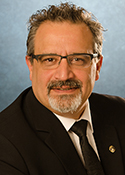Page Content
 Banff is one of my favourite destinations in the whole world. The sight of the rugged, monumental Canadian Rockies takes my breath away. I always loved the mountains as a child, and now I say, "What a beautiful setting for reflection and organizational strategic planning!"
Banff is one of my favourite destinations in the whole world. The sight of the rugged, monumental Canadian Rockies takes my breath away. I always loved the mountains as a child, and now I say, "What a beautiful setting for reflection and organizational strategic planning!"
The Alberta Teachers’ Association’s Provincial Executive Council (PEC) and staff annually hold their fall strategic planning sessions in Banff. We deliberate on the directions we will take as we move toward our preferred future. We listen to world leaders in educational change; we reflect on and discuss the impact of the political landscape on our lives; we listen to each other’s views and share our own. We focus on how we can best serve Alberta teachers in their efforts to continue delivering world-class education. We attempt to link the present to the future and strategize on how to get there.
During these planning sessions, I am reminded of a keynote speaker’s opening remarks many years ago when I attended a conference of the World Council on Curriculum and Instruction in Egypt. The speaker said, "Politics and education do not mix. The fundamental agendas do not allow for compatibility." I had no idea then the impact the remark would have on me throughout my career, especially when discussing the future of education and educational change in our province.
Politics influence all aspects of our lives whether we want to believe it or not. All of us are "in" and play an important role.
Alberta experienced a historic change with the 2015 provincial election. The change in government has created an environment of uncertainty about the direction it may choose to pursue, but there is also a huge opportunity for teachers and the public to influence this direction.
We have the opportunity to shift from defensive strategies to planning an offence that will bring about meaningful change. Our approach in this environment, with this government, has to be different as we forge ahead. Positive relationship building and meaningful consultation/collaboration should become the new normal.
I observe the natural tension that exists between government and the profession. The government — more specifically, the education ministry — has an obligation to deliver quality education under specific budgetary constraints. The profession, on the other hand, makes decisions based on the extent to which it will support teaching and learning conditions. So where does the discourse take place? Who should be the drivers?
Allan Luke, dean of education at the University of Queensland in Australia, at our fall planning session, challenged PEC and the Association to consider its future actions when engaging members, government and the public. His challenge was to create the space for discourse to occur so fresh ideas could be shared and considered.
I believe we can create this space in a variety of settings around the province. Both provincially sponsored and locally sponsored events are fair game. The space would be created to listen rather than tell.
Ricardo Acuña, executive director of the Parkland Institute, suggested at fall planning that more reception and less broadcast would be beneficial and should be the purpose of hosting such events. Authentic input from the field, from the public, becomes the essence of change rather than the top-heavy directives to which we’ve become accustomed.
As a profession, we can no longer stand idly by, letting things happen to us. We must act. We all have roles to play. The provincial ATA has influence with government; the local executives have influence with their boards; teachers have influence with their students’ parents.
"Politics and education do not mix." It’s time to change the narrative. Do we have the will to engage in meaningful collaboration in this political climate in order to maximize the opportunities ahead of us and create the educational future Albertans can continue to be proud of?
The time is now. The challenge is at our feet. We simply need to choose to step forward toward our future.
